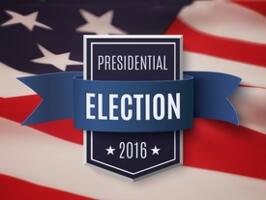Voters Aren’t Happy with NAFTA, Other Free Trade Deals
Donald Trump has vowed to renegotiate NAFTA and other international free trade deals if elected president, saying they are costing U.S. jobs and killing the economy. Supporters say the trade deals lower prices for American consumers. Voters are not big fans of free trade deals like NAFTA but also strongly believe that the politicians negotiating those deals don’t care what they think anyway.
A new Rasmussen Reports national telephone survey finds that 50% of Likely U.S. Voters think the North American Free Trade Agreement (NAFTA) with Canada and Mexico needs to be renegotiated. Just 27% disagree, but nearly as many (23%) are not sure. (To see survey question wording, click here.)
Interestingly, support for renegotiation was slightly higher at 56% in June 2008 when Republican presidential candidate John McCain was defending NAFTA, while his Democratic opponent Barack Obama was calling for changes in it. Now, however, Obama and presumptive Democratic nominee Hillary Clinton are defending the 1994 pact which lowers nearly all trade barriers between the three countries from attacks by the likely 2016 GOP nominee.
Only 29% of voters now believe most U.S. free trade agreements with other countries have been good for America. Forty-nine percent (49%) say they have been bad for the country instead. Just six percent (6%) say these agreements have had no impact. Sixteen percent (16%) are undecided. This is a more critical assessment of the deals than voters had eight years ago.
Republicans and voters not affiliated with either major party are more critical of NAFTA and free trade deals in general than Democrats are.
But only seven percent (7%) of all voters think politicians listen most to voters when it comes to trade issues. Forty-nine percent (49%) say politicians listen most to whoever makes the biggest contribution to them, while 28% say business leaders come first. Eight percent (8%) believe politicians listen most to other world leaders on trade issues. These findings are little changed from the 2008 presidential campaign season.
(Want a free daily e-mail update? If it's in the news, it's in our polls). Rasmussen Reports updates are also available on Twitter or Facebook.
The survey of 1,000 Likely Voters was conducted on June 30 and July 3, 2016 by Rasmussen Reports. The margin of sampling error is +/- 3 percentage points with a 95% level of confidence. Field work for all Rasmussen Reports surveys is conducted by Pulse Opinion Research, LLC. See methodology.
A little over a year ago, just 43% of Americans felt free trade was good for the country. Forty percent (40%) said it takes away American jobs, but 50% felt it was good for consumers.
Sixty-two percent (62%) of Republicans and unaffiliated voters by a 52% to 24% margin think NAFTA needs to be renegotiated. Only 38% of Democrats agree.
The findings are nearly identical when it comes to free trade agreements in general. Most GOP and unaffiliated voters think they are bad for America. Democrats are far less likely to agree and, in fact, are a bit more likely to believe that they are good for the country.
But voters in all three parties are in general agreement that politicians listen more to big contributors and business leaders than to voters when it comes to trade issues.
Men and those 40 and over are more critical of NAFTA and free trade agreements in general than women and younger voters are.
But voters under 40 were Bernie Sanders’ most enthusiastic supporters, and in his unsuccessful bid against Clinton for the Democratic nomination, Sanders also was critical of America’s free trade deals. Perhaps this helps explain why this age group is the most likely to be undecided on these questions.
Among voters who think NAFTA needs to be renegotiated, 76% believe most U.S. free trade agreements with other countries have been bad for America. Sixty-two percent (62%) of those who think NAFTA is fine as is feel that most free trade deals have been good for this country.
The U.S. economy historically has had an average annual growth rate of 3.3% but has fallen short of that number in every year of Obama’s presidency. Still, his fellow Democrats give the president positive marks for his economic performance and think Clinton would do more of the same. Trump, on the other hand, is expected to make the economy better by all voters - except Democrats.
Most voters still believe the U.S. economy is unfair to the middle class. But voters say that economic growth is more important than economic fairness, and they give a thumbs up to policies that expand the economy over policies that promote fairness.
Trump has edged ahead of Clinton in our latest weekly White House Watch survey.
Additional information from this survey and a full demographic breakdown are available to Platinum Members only.
Please sign up for the Rasmussen Reports daily e-mail update (it’s free) or follow us on Twitter or Facebook. Let us keep you up to date with the latest public opinion news.
The survey of 1,000 Likely Voters was conducted on June 30 and July 3, 2016 by Rasmussen Reports. The margin of sampling error is +/- 3 percentage points with a 95% level of confidence. Field work for all Rasmussen Reports surveys is conducted by Pulse Opinion Research, LLC. See methodology.
Rasmussen Reports is a media company specializing in the collection, publication and distribution of public opinion information.
We conduct public opinion polls on a variety of topics to inform our audience on events in the news and other topics of interest. To ensure editorial control and independence, we pay for the polls ourselves and generate revenue through the sale of subscriptions, sponsorships, and advertising. Nightly polling on politics, business and lifestyle topics provides the content to update the Rasmussen Reports web site many times each day. If it's in the news, it's in our polls. Additionally, the data drives a daily update newsletter and various media outlets across the country.
Some information, including the Rasmussen Reports daily Presidential Tracking Poll and commentaries are available for free to the general public. Subscriptions are available for $4.95 a month or 34.95 a year that provide subscribers with exclusive access to more than 20 stories per week on upcoming elections, consumer confidence, and issues that affect us all. For those who are really into the numbers, Platinum Members can review demographic crosstabs and a full history of our data.
To learn more about our methodology, click here.





